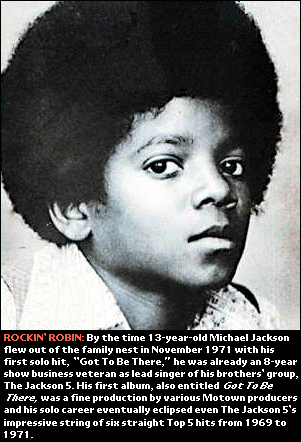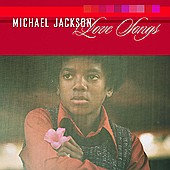|
"Got To Be There" Michael Jackson Motown 1191 Nov. 1971 Billboard: #4
"Got to Be There" was Motown's way of responding to Osmond's solo success. Maybe because it failed to chart as well as "Go Away Little Girl" (it stopped at #4), the label's executives decided that Jackson should avoid such mature-sounding material. His next singles were "Rockin' Robin" and "Ben," songs that were either mindlessly inappropriate (the former) or mindlessly bizarre (the latter). They might have been artistically shallow choices, but sales-wise, they reinstituted Jackson's place in the top two chart positions. With a dull-witted blandness that would define the decade, shallow songs were now outselling their more substantive counterparts. The combination of a decline in record sales and a realization that they were beholden to unusually restrictive terms soured the relationship between the Jackson 5 and Motown. Although the label launched and promoted the band to the status of superstars, the friction between Berry Gordy and the band's father/manager, Joe Jackson, was growing. Besides, much better terms were available. Epic Records offered the group advances and royalties that positively dwarfed its numbers at Motown. One significant problem with the new deal revolved around whether all of the brothers would abandon the label that had nutured them. All opted to leave except one. Jermaine, who had married Berry Gordy's only daughter, Hazel, was torn between loyalty to his family by blood and his family by marriage. In the end, the Jacksons went on to become recording artists for Epic Records, and Jermaine began a career as a solo act for his father-in-law's record label. The year after Michael's "Got To Be There" and the album of the same name was released, he stunned everyone by scoring a huge hit with a song about a rat, "Ben." Jackson was just beginning to make his way outside the family unit, and the single actually did better on the pop side than on the R&B charts, topping the pop list but peaking at number five on the R&B survey. The remainder of the album was good to above-average pop, establishing for any doubters that Jackson was going to suceed, indeed thrive, on his own. A 1973 album, Music & Me, was Jackson's lowpoint during his run at Motown, climbing to only #92 on the pop album charts. With the LP's undistinguished songs, tentative vocals, and routine production and arrangements, Michael began to openly express his desires to expand his horizons and try a fresher, more contemporary approach. Six years would pass before he exploded onto the music scene once again with the accomplished and assured Off the Wall album, a massive hit that sounds less dated today than much of the dance music of that era. And the rest, as they say, is history. - Thomas Ryan, American Hit Radio, Prima Entertainment, 1996.
No comments so far, be the first to comment. |


